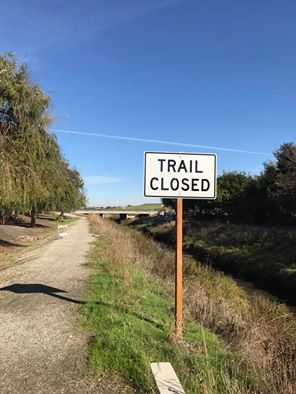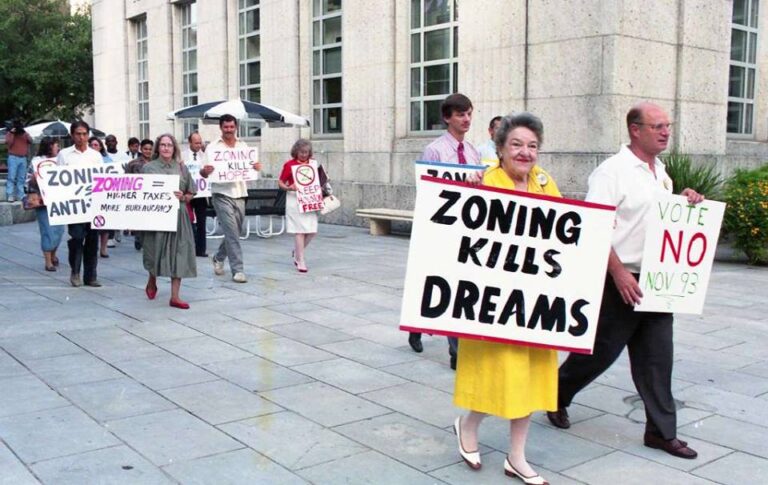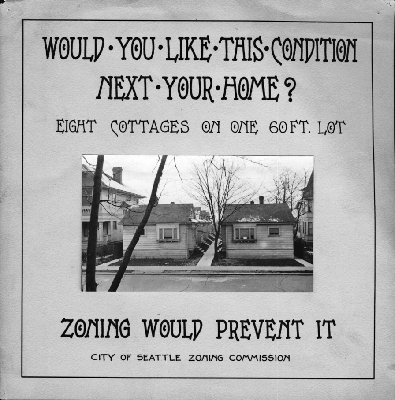Physical Address
304 North Cardinal St.
Dorchester Center, MA 02124
Physical Address
304 North Cardinal St.
Dorchester Center, MA 02124

1. This week at Market Urbansim: Private Neighborhoods And The Transformation Of Local Government by Sandy Ikeda In Private Neighborhoods and the Transformation of Local Government, Robert H. Nelson effectively frames the discussion of what minimal government might look like in terms of personal choices based on local knowledge. He looks at the issue from the ground up rather than the top down. Thoughts On Today’s Emily Hamilton Vs. Randal O’Toole Cato Discussion by Michael Lewyn O’Toole said high housing prices don’t correlate with “zoning” just with “growth constraints.” But the cities with strict regionwide growth constraints aren’t necessarily high cost cities like New York and Boston, but mid-size, moderately expensive regions like Seattle and Portland. 2. MU Elsewhere Emily Hamilton wrote Rules that wreck housing affordability for the Washington Times, analyzing the White House report on housing affordability President Obama deserves credit for recognizing a serious economic problem that is escaping our attention. What’s happening in Takoma is happening in every expensive city in the country, resulting in lost opportunities for the people who need them the most. Reforms to city land-use regulations would not only improve the lives of local renters, but could also improve economic growth for the whole country. Emily‘s debate with Randal O’Toole is also up at Cato 3. Where’s Scott? Scott Beyer is in Los Angeles, and this weekend will be hanging around the California beach towns of Santa Monica, Venice Beach, Manhattan Beach, Long Beach and so on. His three Forbes articles this week were: ‘Friendsgivings’ Are A Growing Urban American Tradition…Could The Fair Housing Act Be Used To Abolish Restrictive Zoning?…and Nativism: The Thread Connecting Progressive NIMBYs With Donald Trump These and countless other examples show the cognitive dissonance of some urban progressives, who blast Trump supporters for their supposed xenophobia and racism, while practicing their own brand of […]

1. This week at Market Urbansim: The Urban Origins of Liberty by Sandy Ikeda Only in the commercial society of the cities, which then as today attracted the ambitious, the talented, and the misfit, did liberty have a real meaning and substance. Only if you can “vote with your feet,” leave the manor or village to pursue your dreams, or simply travel (and have a reason to travel) from place to place, are you really free. One Reason Why Subsidies Aren’t the (Only) Solution by Michael Lewyn The policy paper points out, however, that HUD’s existing project-based and housing choice vouchers could serve more families if the per-unit cost wasn’t pushed higher and higher by rents rising in the face of barriers to new development.” 2. MU Elsewhere Just another reminder to catch Market Urbanist Emily Hamilton debate Cato’s Randal O’Toole on November 29th in Washington, DC, on the question “Should Urban Areas Grow Up or Out to Keep Housing Affordable” (event details) 3. Where’s Scott? Scott Beyer spent his second week in Los Angeles. He wants before leaving on December 11th to organize a dinner party for the area’s many pro-housing activists, so PM him if you’re interested or know someone who is. He published two articles this week–a 5k-word white paper for the Center for Opportunity Urbanism about San Antonio (pg. 40 of this pdf); and one for Forbes titled Globalism — Not Nativism — Is What Made America’s Cities Great Along with the 1 million undocumented immigrants in L.A. County, there is an estimated 500,000 in New York City, 500,000 in the Bay Area, 400,000 in the Houston area, and 260,000 in greater Miami. Impose mass deportation upon these—some of the nation’s most economically dynamic—metros, and the federal government would be ripping out huge portions of their workforce, customer base and entrepreneurial ecosystem. Scott […]

1. This week at Market Urbansim: America’s Progressive Developers–The Uptown Gateway Council by Scott Beyer San Diego, too, may be subject to this downzoning trend. Like California’s other destination cities, San Diego has both a fast-growing population, and restrictive land-use regulations that keep housing supply from meeting demand. But rather than reforming their laws in a progressive direction, they’re doing the opposite. The Psychological Consequences Of Rent Control by Sandy Ikeda Fewer cities today practice the sort of rent control Hayek wrote about in the mid-twentieth century. But government meddling in housing continues in the United States and elsewhere. America’s political leaders are fond of proclaiming a citizen’s “right to housing,” the manifestations of which have been Fannie Mae, politically driven subprime lending, and (at times) expansionary Federal Reserve policy. The macroeconomic results have been obvious and disastrous. But let’s not forget Hayek’s “micro-social” consequences. 2. MU Elsewhere On November 29, Emily Hamilton will debate urban housing issues with Randal O’Toole of the Cato Institute and Gerrit Knaap of the National Center for Smart Growth in Washington, DC (event details) 3. Where’s Scott? Scott Beyer completed his first full week in Los Angeles. He will spend Thanksgiving weekend studying in nearby Riverside, one of California’s fastest growing metros. Much of the growth within this Inland Empire region results from poorer people getting priced out of L.A. and San Diego. 4. At the Market Urbanism Facebook Group: Lyman Stone wrote “Appalachia is Dying. Pikeville is Not. Deep in Kentucky’s Appalachian Mountains, a Small City Finds Success“ Michael Lewyn wants a YIMBY conference in NYC Tobias Cassandra Holbrook is curious about the impact of charter schools on urbanism via Asher Meyers, “A leading light of market urbanism? Herman Mashaba – the new mayor of Johannnesburg.” via Chris Kaz Wojtewicz, Does infrastructure investment lead to economic growth or economic […]

1. This week at Market Urbansim: Preservation At The Expense Of Liberty by Sandy Ikeda Using political power to preserve any cherished way of life — trying to stay the uncertain dynamic that washes through social institutions, norms, and conventions — is not only futile but ultimately destructive of liberty. That goes for preserving a historic community as much as preserving current marriage practices; keeping the natural environment pristine as much as maintaining age-old religious practices; or freezing a particular income distribution as much as insisting on keeping certain “undesirables” outside our borders. 2. Where’s Scott? After flying back from San Antonio, where he gave a speech, Scott Beyer relocated to Glendale, a nearby suburb of Los Angeles. This morning he was the feature cover story (paywall) for the San Antonio Business Journal, which described his cross-country trip and upcoming economic report on the city. 3. At the Market Urbanism Facebook Group: Emily Hamilton published an op-ed about her new Mercatus research on smart cities, privacy, and transparency. “Not all smart city innovations are so benign. City governments increasingly have the ability to collect and use their residents’ data.” Bjorn Swenson asks “what’s the Market Urbanism strategy going to be under the Trump administration?” Bjorn Swenson writes a post reflecting on the election considering the disconnection of transportation between the rust belt and coastal areas Michael Hamilton spotted a California NIMBY billboard in his feed Ahmed Shaker asks, “Is what he (Robin Hanson) says about high-rises being less expensive to construct true?”: Why Aren’t Cities Taller? via Rocco Fama: Does New York need another Robert Moses? via Adam Hengels: While You Weren’t Looking, Donald Trump Released a Plan to Privatize America’s Roads and Bridges via John Morris: The Ghost Tenants of New York City “People underestimate the role informal, “black markets” play in providing housing in severe shortage areas.” […]

1. This week at Market Urbansim: Collective Action Problems Are Similar For Land Use And Schools by Michael Lewyn …it occurred to me that there are some similarities between American school systems and American land use regulation. In both situations, localism creates gaps between what is rational for an individual suburb or neighborhood and what is rational for a region as a whole. The Great Mind And Vision Of Jane Jacobs by Sandy Ikeda As an economist working in the tradition of Mises, Hayek, and Kirzner, what have I learned from Jane Jacobs? In short: Densely populated settlements that embody a wide diversity of both skills and tastes are the incubators of dynamic social development and entrepreneurial discovery—Density + Diversity Development and Discovery—and that government intervention tends to undermine the free air of cities in which even ordinary people can do extraordinary things. Kotkin And The Atlantic- Spreading ‘Localism’ Nonsense Together by Michael Lewyn This is as true in California as it is anyplace else; when Gov. Brown tried to make it easier for developers to bypass local zoning so they can build new housing, the state legislature squashed him. Local zoning has become more restrictive over time, not less. 2. Where’s Scott? Scott Beyer completed his San Diego stay, and is heading today into the Mexican border city of Tijuana, before moving to Los Angeles. He wrote 4 articles this week: San Antonio’s Growth Part of a Macro-Level U.S. Trend for The Bexar Witness & When Texas Stopped Looking and Feeling Like Mexico for Governing Magazine & Here’s Why Your Home Is 24% Overpriced & Philadelphia’s SEPTA Transit Workers Go On Strike…Again for Forbes. There is an entire eco-system of private transit options, big and small, that exist in most cities, including Philly. Many of them have already released formal game plans for this strike, showing the […]

1. This week at Market Urbansim: ‘Who better to determine local needs than property owners and concerned citizens themselves?’ by Michael Hamilton Instead, land-use regulations can, and often are, used as cudgels against disfavored groups or individuals. Issues of personal taste—yard size, material choices, building design, amount of parking—can be weaponized when turned into regulatory requirements and greatly decrease a plot of land’s value. Donald Shoup Takes San Francisco by Sandy ikeda As I said before, to do market pricing correctly, well, you need markets. What the San Francisco approach does is to try to mimic what it is thought a private market would do. But the standard of “at least one empty parking spot” is arbitrary – like mandating that every ice-cream cone have two and only two scoops of ice cream. The Shoup-inspired San Francisco solution is I think a step in the right direction, but only a step. Episode 05 of the Market Urbanism Podcast with Nolan Gray: Samuel Zipp and Nathan Storring on Vital Little Plans This week on the Market Urbanism Podcast, I chat with Samuel Zipp and Nathan Storring on the wonderful new volume Vital Little Plans: The Short Works of Jane Jacobs. From Jacobs’ McCarthy-era defense of unorthodox thinking to snippets of her unpublished history of humanity, the book is a must-read for fans of Jane Jacobs. In this podcast, we discuss some of the broader themes of Jacobs’ thinking America’s Progressive Developers–Silver Ventures by Scott Beyer Foremost among these is the Pearl Brewery, a 22-acre former industrial site that is north of downtown. “The Pearl” is now viewed by locals as San Antonio’s leading urbanist destination—as opposed to the touristy downtown—but it wasn’t always this way. 2. Where’s Scott? Scott Beyer spent week 4 in San Diego. His Forbes article was about […]

1. This week at Market Urbansim: The Invisible City by Sandy Ikeda It is this: A city—especially a great one—cannot really be seen. Paradoxically, the closest we can come to actually seeing one is through the imagination. Otherwise, it’s invisible. Moreover, if you can fully comprehend a place, then it’s not a city. 2. Where’s Scott? Scott Beyer spent his third week in San Diego. His Forbes article this week asks What Is The Best City In Texas? Not only is Houston Texas’ best city; it is among a handful of emerging ones in the U.S.—including Los Angeles, San Diego, Miami, Denver, Atlanta and Seattle—that will become the dense infill cities of tomorrow. 3. At the Market Urbanism Facebook Group: Emily Hamilton was interviewed on the Economics Detective podcast with Garrett Malcolm Petersen Brendon Harre wrote: Reciprocal intensification property rights Michael Hamilton wrote “another post about Obama‘s toolkit”: Who better to determine local needs than property owners and concerned citizens themselves? Roger Valdez wrote: Massachusetts Tries A New Solution For Chronic Homelessness Anders Mikkelsen shared a 1922 Seattle Zoning Commission post, arguing for zoning to keep out poor via Tom W Bell: The Tallinn experiment: what happens when a city makes public transport free? via David N Welton: The Neighbors Dilemma via Nolan Gray: Report: One Person Called In 84 Percent Of Dulles Noise Complaints via John Morris: Pentagon Video Warns of “Unavoidable” Dystopian Future for World’s Biggest Cities via David Iach: A Vision for a Chicago Unified by Rivers via Anthony Ling: As Land-Use Rules Rise, Economic Mobility Slows, Research Says 4. Elsewhere: Hey, Leonardo DiCaprio: true climate champions don’t fight against urban density David Roberts, Vox Wapo: There is no such thing as a city that has run out of room City Journal reviews a new biography about Jane Jacobs Reason Magazine […]

1. This week at Market Urbansim: Markets As Cities by Sandy Ikeda There is a deep affinity between cities and markets, and indeed between cities and liberty. (As the old saying goes, “City air makes you free.”) Cities aren’t merely convenient locations for markets; a living city (which I’ll define in a moment) is a market. MU Podcast Episode 04: Anthony Ling on Brazilian Cities and the Future of Transportation Anthony is founder and editor of Caos Planejado, a Brazilian website on cities and urban planning. He also founded Bora, a transportation technology startup and is currently an MBA candidate at Stanford University. He graduated Architecture and Urban Planning at Universidade Federal do Rio Grande do Sul. 2. Where’s Scott? Scott Beyer spent his second week in San Diego, and this weekend is visiting Corona Del Mar in Orange County, where he’ll get a driving tour from some MU enthusiasts. His Forbes articles this week were America’s 20 Largest Metros Have Higher GDPs Than Most Foreign Nations and Austin’s Rail Transit Boondoggle, Further Explained Agencies like Austin’s CapMetro are dogmatic and unimaginative. They observe a top-down solution, such as rail transit, that may work in a few U.S. cities; they take the plan off the shelf and plop it into their own city, regardless of whether or not it fits; then, when the project fails miserably–as it has in many cities–they send out their press team to justify it, using every crackpot methodology. Scott will be returning November 9 to San Antonio to give a speech on the city’s economic emergence. Here’s a write-up about the event by the San Antonio Business Journal. 3. At the Market Urbanism Facebook Group: Louise Ortensia asks “Capitalism for urbanists? Pretty redundant, isn’t it?” An interesting dialogue ensues… David Welton asks “has anyone here contacted local politicians in […]

1. This week at Market Urbanism: 4 Things Austin’s City Council Could Do Today To Fight The Housing Shortage by Dan Keshet Central Austin needs more housing. Prices have been rising, more and more people want to live where they have short commutes, but are only able to afford homes near the periphery. We have a long-term plan to alter our land development code in a way that would help…but our need is now. What options are available today? Spillovers: Knowledge, Beer, and Technology by Sandy Ikeda I don’t think anyone could reasonably contest that technology has reduced the need for some kinds of proximity. It’s the tired hyperbole that “science obliterates distance” and the like that gets my goat. The gulf between “reducing” and “eliminating” is too vast. Where Do Upzonings Happen? by Chris Bradford What NIMBYs are really after is limiting access to neighborhood amenities, mostly by limiting the quantity of housing. Neighborhoods (at least the ones empowered politically) do their best to hold housing below the market-clearing quantity. Book Review: The Well-Tempered City by Emily Hamilton a review of a book by Jonathan F. P. Rose In the vein of Jane Jacobs and F.A. Hayek, Rose identifies that cities are “wicked” problems rather than engineering problems that policymakers can solve through tinkering. In spite of this recognition of the complexity of cities’ interrelated systems, Rose asserts that cities need visionaries to address problems from obesity to climate change from the top down. 2. Where’s Scott? Scott Beyer has changed his schedule. He thought San Diego would be a pass-through stop this week on the way to Los Angeles. But he found “America’s Finest City” surprisingly dense, and decided to stay all of October. His two Forbes articles this week were about The Millennials Transforming San Antonio and […]

1. This week at Market Urbanism: Joel Kotkin’s New Book Lays Out His Sprawling Vision For America by Michael Lewyn So if I interpret his book correctly, it seems that there is nothing libertarian about Kotkin’s views: he wants strong local governments that keep new housing out of cities but allows it in undeveloped exurbs where it belongs. NIMBYism As An Argument Against Urbanism by Michael Lewyn [Kotkin] cites numerous examples of NIMBYism in wealthy city neighborhoods, and suggests that these examples rebut “the largely unsupported notion that ever more people want to move ‘back to the city’.” This argument is nonsense for two reasons. The Demand Curve For Sprawl Slopes Downward by Sandy Ikeda There has been a lot of Internet chatter lately about what libertarians ought to think about urban sprawl and its causes, including pieces by Kevin Carson, Austin Bramwell, Randal O’Toole, and Matthew Yglesias. The title of Ben Adler’s post basically sums it up: “If You Love the Free Market, You Should Hate Mandated Suburban Sprawl.” Econ 101 And The Missing Middle by Chris Bradford Some cities build more single-family than multi-family. Some build more multi-family than single-family. But the fourplex is dead. We build very little small-scale multi-family these days, which is why the “missing middle” is a focus of zoning code rewrites and a meme among the New Urbanist crowd. You’re an Urbanist? Excellent. Why Aren’t You a Developer Yet? by R John Anderson This question becomes a bit more pointed when you recognize that many conventional developers are doing work in urban settings under duress or without much of a clue about how to make their efforts fit an urban context. I think the typical generalist/urbanist will do a better job than whatever big development outfits are working in their city. 2. […]